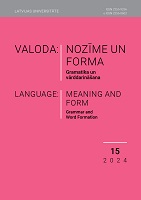Modālais darbības vārds drīkstēt īstenības izteiksmē un valodas ietekmējošā funkcija Saeimas sēžu stenogrammu korpusā
Modal verb drīkstēt ‘may’ in indicative mood and the conative function of language in the Corpus of the Saeima
Author(s): Anete DainaSubject(s): Theoretical Linguistics, Syntax, Baltic Languages, Philology
Published by: Latvijas Universitātes Akadēmiskais apgāds
Keywords: modality; modal verb; indicative mood; the conative function of language;
Summary/Abstract: The focus of the study is on Latvian modal verb drīkstēt ‘may’ in indicative mood. The object of the research is verbatim reports from the Corpus of the Saeima (the parliament of Latvia). When analysing the use of drīkstēt ‘may’ in indicative mood, in addition to determining and interpreting its modal meanings, its possible connection to the conative function of language, as well as the frequency of the use is being taken into account. According to statistics, the most used form of modal verb drīkstēt ‘may’ is the negated present simple third person, the least used – the past simple and future simple first and second person, also the compound tenses. It has been also observed that drīkstēt ‘may’ is more often used in negation (5200 uses) than in affirmation (1745 uses). The analysis of these uses shows that in verbatim reports of the Saeima it is more common to express general prohibitions, instructions and reprimands, which often are rather dictated by general regulations or even laws, and not so much by the author of the text; furthermore, the addressee often is not specific, and thus, the conative function is indirect.
Journal: Valoda: nozīme un forma
- Issue Year: 2024
- Issue No: 15
- Page Range: 24-41
- Page Count: 18
- Language: Latvian

